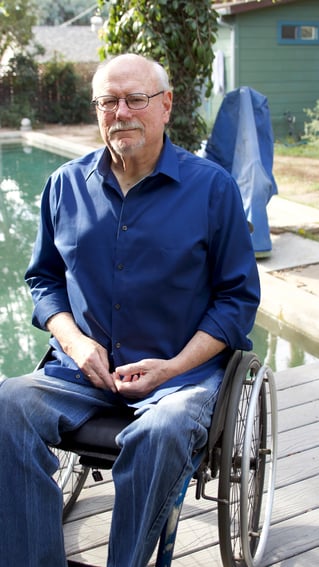The Smallest of Changes
Some problems attendants to a lifetime of paralysis are difficult, frustrating, painful, and demoralizing. But many chronic problems have simple solutions. They are often self-willed and demand a habitual state of mind. For instance: you won’t get pressure sores if you don’t stress or damage any of the skin that might result in breakage, from your ankle to your backside. Also easy: never stop stretching. I don’t do it enough myself, but it is not difficult. If you are in a chair, you probably know this litany of do’s and don’t’s. But something recently came to me that is an even easier fix for many common complaints growing out of sitting in a seat for 14 hours a day, every day. It’s called posture.

“Oh, come on,” you are saying, “Posture is a subject for charm schools where you walk across a room with a book on your head.” Yes, it’s also the same, seemingly trivial subject your mom would lecture you about when you were eleven. “Sit up straight! Slouching is rude and slothful. And pull in your stomach! You’re embarrassing me!” Those exact words came from my own mother, may she rest in peace, who was very posture conscious. It wasn’t a physical adjustment; it was a moral imperative. Which made her children all posture averse. We slouched and slouched.
Posture came to me as a health benefit only last year as I was recovering from a reverse shoulder replacement operation. This is a prosthetic procedure where they replace the ball and socket in your shoulder with a steel ball and plastic socket and reverse their position for better mechanics. The recovery, with both pain and range of motion, has been slow, even with lengthy physical therapy and supervised stretching. It’ll get there, but at least with my ancient shoulder, it’s taking its damn time.
The shoulder soon was effectively healed, but an intermittent, dull, localized pain persisted. I didn’t want to snuff it out with meds, I wanted to fix it. One evening, it bothered me again, I simply sat up straight as a boot camp trainee and the pain faded away. It was postural, not permanent. This soon became a constant practice – many times a day, I’d stop for a few minutes and sit up straight. And hold it. Your shoulders will thank you. Your back will thank you. Your neck is especially grateful. You may have a poor-posture headache – I have it all the time – and it will lighten and sometimes disappear. You will naturally pull in your stomach. And you will breathe.
I have never been a successful meditator and have always thought I simply lacked the will or gumption. Then I realized I wasn’t alone, especially after reading the best-selling self-help author, Gretchen Rubin. She doesn’t find meditation, the much-ballyhooed route to spiritual liberation, all that useful, either. She writes in her daily blog that she finds her own form of “waking up” is not through the mind, but through the body. The idea is to get outside of your head, not deeper into it. Long-distance runners and power lifters know this intuitively. Ms. Rubin takes this different tack in her new book, “Life in Five Senses.” She doesn’t want to learn a new disciple. She wants to expand the definition of recess, that time-honored grade school play period, to include unstructured time for adults to feed the senses. The brain will respond accordingly.
Posture is a minor outside-in kind of thing. It’s merely an attention-changer, a cue. First of all, I’m already seated, so there’s not a lot of prep work or set-up time. Every time you stop and correct your posture, and hold it, the voices in your head pipe down. Your upper body feels a brief release and your natural instinct is to stretch or breathe deeply.
It’s like that sixty-second break between rounds in boxing, only not as sweaty. Now take one last deep breath and head back to the battlefield.
Join Our Movement
What started as an idea has become a national movement. With your support, we can influence policy and inspire lasting change.
Become an Advocate